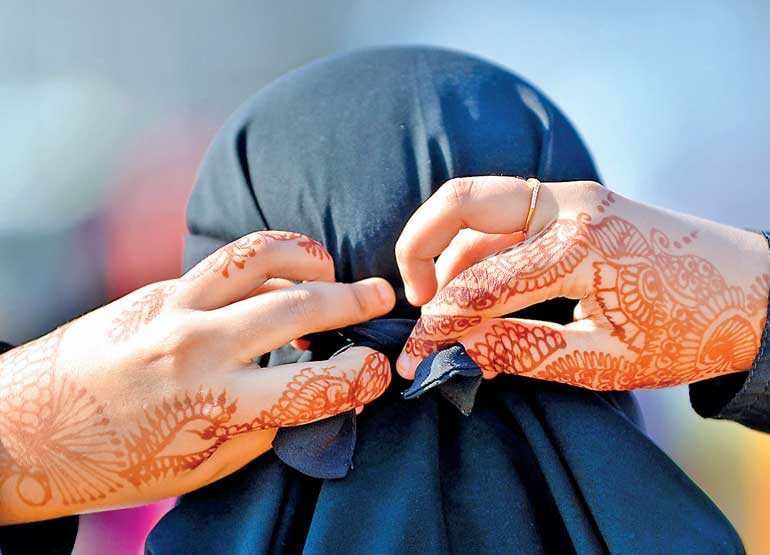Saturday Feb 14, 2026
Saturday Feb 14, 2026
Wednesday, 16 October 2019 00:56 - - {{hitsCtrl.values.hits}}

The problems that this dress has created could have been nipped in the bud had ACJU/M hierocracy noticed quite early in late 1980s the slow penetration of a new wave of Arab dress code, introduced by returnees from the Gulf and popularised by Muslim businessmen – Pic by Shehan Gunasekara
MMDA saga continues without an end. After nine years of gestation, the Justice Saleem Marsoof (JSM) Committee which, for the first time in Sri Lankan Muslim history, lent an ear to the voice of Muslim women on a matter that affects their lives directly, produced a report recommending a few progressive reforms to do justice to Muslim women’s grievances.
No sooner that report was released, saboteurs, led shamelessly by the All Ceylon Jamiyyathul Ulama (ACJU), which should be more appropriately called All Ceylon Jamiyyathul Mullahs (ACJM), started all tricks in their trade to undo some of the progressive recommendations, which, frankly speaking, were in no way radical. ACJU/M engineered a mini-revolt in that committee and submitted a counter report to Minister Thalatha Athukorale. 
The minister, being a non-Muslim, obviously could not count the relative political cost of accepting either of the two, and quite adroitly passed the buck to Muslim politicians in her government. These politicians, led by Sri Lanka Muslim Congress (SLMC), in turn counted their own political costs of accepting either the JSM recommendations in full or the counter report backed by ACJU/M. Behind the two sets of recommendations was the crucial decider, Muslim vote bank.
Finally, after several revisions and re-revisions, amendments and counter amendments a compromised or rather sanitised version of JSM recommendations was accepted by the minister and is now waiting to be legislated. The term of the present Government is fast running out and election fever has infected all parliamentarians. In all probability therefore, no legislation on MMDA can be expected to appear this year.
In the meantime, Rev. Athureliye Rathana Thera, a Buddhist supremacist representing JHU in the parliament and who went on a highly dramatised hunger strike in the precincts of the Maligawa demanding the removal of one Muslim minister and two Muslim Governors from their positions, has taken the opportunity to put another spoke in MMDA wheel by introducing a private bill in the parliament for one common law to govern all marriages in the country.
This is a deliberate strategy to sabotage MMDA in the name of legislative uniformity. It appears that his bill will come up for debate sooner than expected. It is a strange irony that a Buddhist monk, who has vowed to remain celibate to reach enlightenment, has taken the issue of marriage, divorce and conjugal relations to advance his political career.
Be that as it may, the monk’s private bill is a new and more menacing headache to Muslims to deal with. Although he has been talking about one-country-one-law since last June, ACJU/M and its political backers, by their deliberate delaying tactics and continued aversion towards advancing the cause of Muslim women, have given this supremacist an opportunity to pick the right moment to sabotage even the little that the women hoped to achieve through the impending reforms.
Although marriage is a social institution there are certain peculiarities in every culture that need to be respected and recognised by laws that govern that institution. Variety and diversity is socially enriching and beautiful, whereas uniformity impoverishes and is monotonous. However, within the diverse cultural norms all laws governing marriage and divorce must treat men and women equally. Unfortunately, this is not the case with the current MMDA. This is why Muslim women are fighting and there is justice in their fight. The battle for Muslim women is therefore not over yet.
Although marriage is a social institution there are certain peculiarities in every culture that need to be respected and recognised by laws that govern that institution. Variety and diversity is socially enriching and beautiful, whereas uniformity impoverishes and is monotonous. However, within the diverse cultural norms all laws governing marriage and divorce must treat men and women equally. Unfortunately, this is not the case with the current MMDA. This is why Muslim women are fighting and there is justice in their fight. The battle for Muslim women is therefore not over yet
If the monk succeeds in his attempt to get his bill legislated, it will be entirely because of ACJU/M’s obstinacy or tardiness to allow progressive changes, and Muslim politicians’ obsequiousness to that body. In fact, JSM must have foreseen this obstacle, which prompted it to include a provision that if its recommendations were to be rejected, as a last resort, an option be given to Muslim women to marry under the General Marriage Ordinance. This may have pre-empted the monk to make his move.
Similarly, the ‘niqab’ and ‘burqa’ issue is also hanging in the air without proper guidance from ACJU/M and political leaders. ACJU/M conceded to the ban under the emergency, and now that the emergency has been lifted ACJU/M wants to uphold its previous stand on the issue, that it is a woman’s inalienable human right to wear whatever she wants, while advising her at the same time to ‘exercise caution’ when wearing it in public places.
How meaningless this advice is clear when one realises that niqab and burqa are worn only when women go out in public and facial covering is not necessary when they are at home, unless a stranger to the family enters the house. Muslim politicians also concur with ACJU/M’s position. Yet, this dress still remains banned in Uva Province.
As journalist Ranga Jayasuriya rightly argued on 24 September, Muslim leaders are ‘mishandling’ the problem. Niqab and burqa are not a human right issue but an issue concerning social cohesion and public peace. Therefore, the right questions to be asked are, (a) whether veiling the face increases or decreases social cohesion and public peace, (b) whether uncovering the face reduces the religious purity of a Muslim female, and (c) whether uncovering the face contravenes the Quranic requirement of modesty.
There are two principles that govern the appropriateness of a norm or rule in Islamic jurisprudence, namely ‘maslaha’ (public interest) and ‘darura’ (necessity). Social cohesion and public peace fall under maslaha and the need to guard religious purity falls under darura. Niqab and burqa, by reducing social cohesion and disturbing public peace go against the principle of maslaha. Uncovering the face does not in any way reduce the religious purity of a Muslim female and does not contravene the Quranic request for modesty in dressing. Therefore under the criteria of darura, niqab and burqa are not necessary.
Above all this, one must not forget that the attire of a human is conditioned primarily by climatic and geographical factors and only secondarily by one’s culture. These two pieces of dress, mostly appearing in black colour, are inappropriate to a hot and humid Sri Lanka, and they belong to a different culture alien to this country.
If the monk succeeds in his attempt to get his bill legislated, it will be entirely because of ACJU/M’s obstinacy or tardiness to allow progressive changes, and Muslim politicians’ obsequiousness to that body. In fact, JSM must have foreseen this obstacle, which prompted it to include a provision that if its recommendations were to be rejected, as a last resort, an option be given to Muslim women to marry under the General Marriage Ordinance. This may have pre-empted the monk to make his move
The problems that this dress has created could have been nipped in the bud had ACJU/M hierocracy noticed quite early in late 1980s the slow penetration of a new wave of Arab dress code, introduced by returnees from the Gulf and popularised by Muslim businessmen. There were already some muted rumblings at that time from the public. All that was required was to inform and educate the females of the unsuitability of that dress in a multicultural society in which the majority consider it confronting.
ACJU/M’s irrational orthodoxy blinded it from seeing the long term consequences of a changing Muslim identity through attire and appearance. Those rumblings were unmuted after the Easter carnage, and niqab and burqa came to be viewed as part of a terrorist outfit. Government was compelled to interven and ban that dress under emergency regulation. At least after that incident one would have thought that ACJU/M would realise the gravity of the situation and educate its womenfolk accordingly. On the contrary, it is still showing no signs of change. Unfortunately, the community has to suffer because of short-sighted leadership.
For centuries, Muslim women in this country wore colourful sarees with a head piece or the shalwar with shawl without any qualm. In fact, even non-Muslim women wore that dress and there was increased social contact and friendliness among different communities. Today, dressing in the name of religious and cultural identity and purity has widened social cleavages and even encouraging isolation. The close neighbourliness that prevailed in the past between Muslims and the rest has received a setback in the face of non-indigenous cultural trappings.
There is also an element of hypocrisy among those who advance the human right argument. If it is a human right to wear niqab and burqa then it is also a human right not to wear them. There are hundreds of thousands of Muslim girls and women in the Gulf countries and Afghanistan in particular, who want to get out of this dress, but authorities there won’t let them. Will ACJU/M and its foot soldiers demonstrate in front of those embassies and demand freedom to those women in the name of human right?
The Muslim community is going through a turbulent period and there are far more important and challenging issues than niqab and burqa that have to be tackled and won. For example, the rising wave of Buddhist supremacy, which is a political movement that contravenes all principles of Buddhism, and which is vowing to deny the minorities any rights in this country, is an immediate and existential threat.
How are the Muslims going to confront this menace without the support of fellow Sri Lankans? ACJU/M and other Muslim leaders should at least avoid providing ammunitions to the supremacists by fighting over frivolous issues like a piece of dress. Get rid of niqab and burqa and move on, before anything untoward happens!
(The writer is attached to the School of Business and Governance, Murdoch University, Western Australia.)